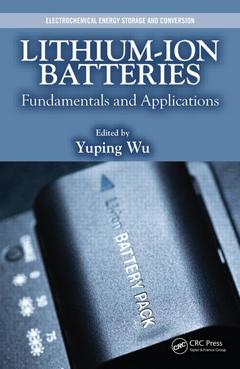Description
Lithium-Ion Batteries
Fundamentals and Applications
Electrochemical Energy Storage and Conversion Series
Language: English
Subjects for Lithium-Ion Batteries:
Keywords
Lithium Ion Batteries; Positive Electrode Materials; positive; Electrochemical Performance; electrode; Reversible Capacity; materials; Negative Electrode Materials; electrochemical; Gel Polymer Electrolyte; performance; Sei Film; reversible; Ionic Conductivity; capacity; Negative Electrode; negative; Energy Density; material; Organic Electrolyte; dimethyl; Irreversible Capacity; Lithium Salt; High Ionic Conductivity; Coulombic Efficiency; Sol Gel Methods; Cycling Performance; Polymer Electrolyte; Lithium Intercalation; Polymer Lithium Ion Batteries; Lithium Insertion; Conductive Agent; Solid Polymer Electrolytes; Carbon Negative Electrode; Initial Coulombic Efficiency
· 15.2x22.9 cm · Hardback
Description
/li>Contents
/li>Biography
/li>
Lithium-Ion Batteries: Fundamentals and Applications offers a comprehensive treatment of the principles, background, design, production, and use of lithium-ion batteries. Based on a solid foundation of long-term research work, this authoritative monograph:
- Introduces the underlying theory and history of lithium-ion batteries
- Describes the key components of lithium-ion batteries, including negative and positive electrode materials, electrolytes, and separators
- Discusses electronic conductive agents, binders, solvents for slurry preparation, positive thermal coefficient (PTC) materials, current collectors, and cases
- Examines the assembly processes and electrochemical performance of lithium-ion batteries
- Explores applications in power tools, electric vehicles, aerospace, and more
Lithium-Ion Batteries: Fundamentals and Applications delivers a systematic overview of lithium-ion batteries, from physical properties to manufacturing technologies. The book also supplies valuable insight into potential growth opportunities in this exciting market.
Introduction. LiCoO2-Based Positive Electrode Material. LiNiO2-Based Positive Electrode Materials. Spinel LiMn2O4-Based Positive Electrode Materials. LiFePO4-Based Positive Electrode Materials. Other Positive Electrode Materials. Negative Electrode Materials Based on Carbon. Noncarbon Negative Electrode Materials. Liquid Electrolytes. Solid Electrolytes. Gelled Polymer Electrolytes. Separators. Other Materials for Lithium-Ion Batteries. Assembly Processes for Lithium-Ion Batteries. Electrochemical Performance of Lithium-Ion Batteries. Applications of Lithium-Ion Batteries.
Yuping Wu received his Ph.D from the Institute of Chemistry, Chinese Academy of Science, Beijing, and conducted his postdoctoral research at Tsinghua University, Beijing, China. He has been a visiting researcher at Waseda University, Tokyo, Japan; a Humboldt fellow at Technische Universität Chemnitz, Germany; and a full professor in the Department of Chemistry, Fudan University, Shanghai, China. Widely published and highly decorated, Dr. Wu is currently affiliated with the College of Energy, Nanjing Tech University, China. A popular speaker, he has served as co-chair of the International Union of Pure and Applied Chemistry International Conference on Novel Materials and their Synthesis, as well as an advisory board member for several journals.




